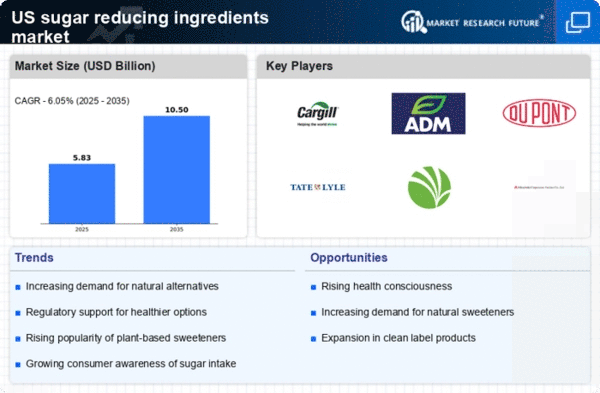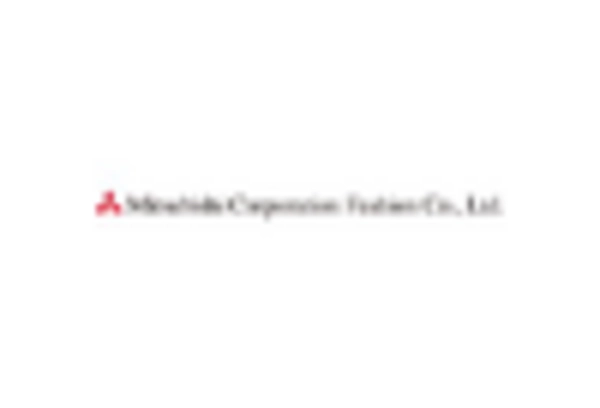Shift Towards Clean Label Products
The trend towards clean label products is reshaping the sugar reducing-ingredients market. Consumers are increasingly scrutinizing ingredient lists, favoring products that are perceived as natural and free from artificial additives. This shift is prompting manufacturers to seek sugar reducing-ingredients that align with clean label principles, such as natural sweeteners derived from plants. As a result, the market for sugar reducing-ingredients is witnessing a surge in demand for products that not only reduce sugar content but also meet consumer expectations for transparency and quality. Market Research Future suggests that nearly 60% of consumers are willing to pay a premium for clean label products, indicating a lucrative opportunity for companies in the sugar reducing-ingredients market. This trend is likely to continue influencing product development and marketing strategies in the coming years.
Health Consciousness Among Consumers
The increasing awareness of health issues related to excessive sugar consumption is a primary driver in the sugar reducing-ingredients market. Consumers are becoming more health-conscious, leading to a shift in dietary preferences. According to recent surveys, approximately 70% of consumers in the US are actively seeking to reduce their sugar intake. This trend is prompting food and beverage manufacturers to reformulate their products, incorporating sugar reducing-ingredients to meet consumer demand. The sugar reducing-ingredients market is thus experiencing growth as companies strive to offer healthier alternatives. This shift not only addresses health concerns but also aligns with the broader trend of clean label products, where transparency in ingredient sourcing is paramount. As a result, the sugar reducing-ingredients market is likely to expand as more consumers prioritize health and wellness in their purchasing decisions.
Rising Demand for Low-Calorie Products
The growing consumer preference for low-calorie and low-sugar products is a significant driver in the sugar reducing-ingredients market. As individuals become more health-conscious, they are increasingly seeking alternatives that allow them to enjoy sweet flavors without the caloric burden of traditional sugars. This trend is evident in the food and beverage industry, where products labeled as 'low-calorie' or 'sugar-free' are gaining traction. Market data indicates that the demand for low-calorie sweeteners is expected to grow by approximately 8% annually over the next five years. Consequently, manufacturers are compelled to incorporate sugar reducing-ingredients into their formulations to meet this rising demand. The sugar reducing-ingredients market is thus positioned to thrive as consumers prioritize healthier options in their diets.
Regulatory Support for Healthier Options
Regulatory bodies in the US are increasingly advocating for reduced sugar consumption, which significantly impacts the sugar reducing-ingredients market. Initiatives aimed at lowering sugar intake, such as the FDA's guidelines on added sugars, encourage manufacturers to explore alternatives. These regulations create a favorable environment for the development and adoption of sugar reducing-ingredients. For instance, the FDA's proposed changes to nutrition labels emphasize the need for clearer information on sugar content, prompting companies to reformulate their products. This regulatory support not only drives innovation but also enhances market growth, as businesses seek to comply with new standards. The sugar reducing-ingredients market is thus positioned to benefit from these regulatory frameworks, which aim to promote healthier eating habits among the population.
Technological Advancements in Ingredient Development
Technological innovations play a crucial role in shaping the sugar reducing-ingredients market. Advances in food science and technology have led to the development of novel sweeteners and sugar substitutes that mimic the taste and texture of sugar without the associated calories. For example, the emergence of high-intensity sweeteners and fiber-based ingredients has expanded the options available to manufacturers. This innovation is particularly relevant as the market for sugar reducing-ingredients is projected to reach $1.5 billion by 2026, reflecting a compound annual growth rate (CAGR) of 5.5%. As companies invest in research and development, the sugar reducing-ingredients market is likely to see a continuous influx of new products that cater to diverse consumer preferences, further driving market expansion.
















